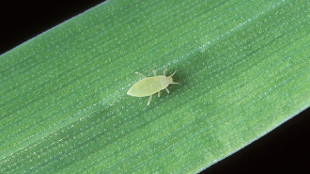 WIKIMEDIA
WIKIMEDIA
In an effort to cut back on the need for pesticides, many research groups have developed genetically modified (GM) wheat that can fight pathogens and resist pests. Besides incidental appearances of Monsanto’s Round-up Ready wheat, just one variety of GM wheat has made it out of the lab and into the field for testing. But according to a study published in Scientific Reports yesterday (June 25), those field trials have failed.
Researchers at Rothamsted Research in Harpenden, U.K., designed the study, which took place over the course of several months in 2012 and 2013, to test the resistance of wheat programmed to make a pheromone that repels aphids, insects that feed on and transmit viruses to plants. The pheromone, called (E)-β-farnesene (Eβf) also attracts some ...













